Brandywine Stories: Chester County Pathfinder
Photos courtesy of the Chester County History CenterHow Ann Preston blazed a trail for woman doctors
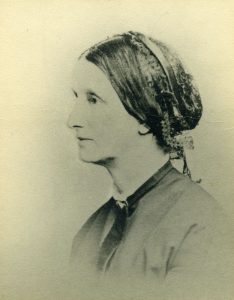
In October 1847, the Geneva Medical College of New York accepted Elizabeth Blackwell as a student. She became the first woman to earn a medical degree in the United States.
But years before Blackwell’s achievement, the subject of women in medicine was already being discussed in Chester County. In 1846, Dr. Bartholomew Fussell of Kennett Square invited a very select company of local doctors to his home to discuss the subject of training women in medicine.
Despite Dr. Fussell planting these early seeds, it was a Bucks County Quaker named Joseph Longshore who spearheaded the opening of the Female Medical College of Pennsylvania in 1850 (the name was later changed to Woman’s Medical College of Pennsylvania, or WMCP). The first graduating class in December 1851 included Chester County’s Ann Preston.
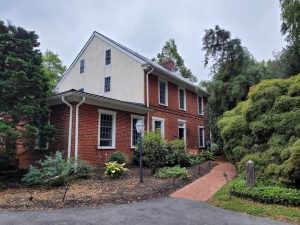
Dr. Preston was born in West Grove in 1813, into a Quaker family active on the Underground Railroad. Six months after graduating from medical school, Dr. Preston was invited to speak at the first Pennsylvania Woman’s Rights Convention in June 1852, held in Horticultural Hall in West Chester (now the Chester County History Center). In 1853, the Woman’s Medical College offered Ann Preston the position of chair of physiology, and she became the first female professor in a regular medical college in the country.
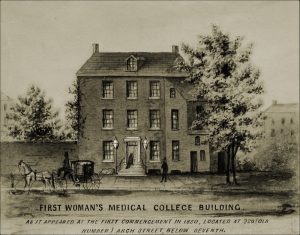
Many medical students of the time graduated without ever having interacted with an actual patient, but Dr. Preston believed that hands-on experience was critical. When she approached Pennsylvania Hospital to allow her students to attend clinical demonstrations with male students, the hospital refused. Undaunted, Dr. Preston poured her energy into opening the Woman’s Medical College’s own hospital in 1861, which provided a place for female medical students to diagnose and treat diseases.
In 1865, the Woman’s Medical College offered Dr. Preston the position of dean, making her the first female dean of a degree-granting medical college in the United States.
The Jeering Episode
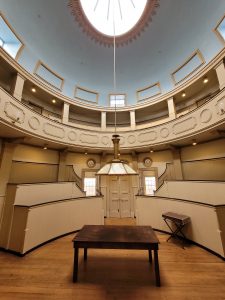
Dr. Preston played a central role in the Jeering Episode, one of the most shameful events in the history of American medicine. In November 1869, Dr. Preston again requested that Pennsylvania Hospital allow her students to attend clinical demonstrations, and for the first time the hospital agreed.
When the female medical students entered, the male students shouted, hissed, threw wads of paper with insulting notes and spit tobacco juice on them. Afterward, male students blocked the sidewalk, forcing the women to walk in the muddy road. The men also sang “The Rogue’s March,” a song meant to show contempt and sometimes used for executions by firing squad.
Ann Preston’s Legacy
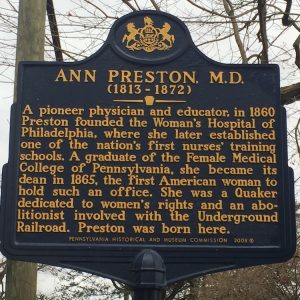
Dr. Preston never married nor had children. In 1871, she began to feel unwell — she couldn’t eat, sleep or find a comfortable sitting position. This final affliction lasted for months, and though she tried to continue her work, she ultimately realized that she would not recover.
She arranged for Emeline Horton Cleveland, one of the most brilliant doctors in the country, to take over from her as dean, ensuring a seamless transition for her beloved medical school. Preston died on April 18, 1872 at just 58 years old.
Today’s Woman Physicians
In 2017, for the first time in history, more women entered American medical schools than men. Today, women account for 38% of active physicians country-wide, which represents an increase from 26% in 2004. Despite this growth, women remain a minority in almost all of the 20 largest specialties except for pediatrics, obstetrics and gynecology, and dermatology.
More Pioneering Woman Doctors
Ann Preston’s legacy was not just in the medical college, the hospital or women’s rights. It was in the people. In 2023, the Chester County Archives and Records Services highlighted the following Woman’s Medical College of Pennsylvania (WMCP) alumnae as part of their “Chester County’s Pioneer Female Physicians” project.
- Clara Marshall: Born in 1847, Clara Marshall’s family lived in several towns in Chester County, including Kennett Square. Dr. Marshall enrolled in WMCP in 1871, graduated in 1875 and became a professor there in 1876. In 1888 she was named dean and held that position until 1917.
- Jane Rogers Baker: Born in 1867 in Glen Mills, Dr. Baker graduated from WMCP 1892. In 1900 she was named superintendent of the newly established Chester County Asylum in Embreeville, and in 1911 she opened a private care facility in West Chester for patients with mental illness and developmental disabilities.
- Mary Hickman Cheyney: Dr. Cheyney was raised on a farm on what’s now the grounds of Cheyney University. She graduated from WMCP in 1885 and was the first and only female physician on the staff of the Chester County Hospital when it opened in 1892.
- Ida Virginia Reel: Born in Philadelphia, Dr. Reel graduated from WMCP in 1882 and established a private practice in Coatesville in 1889. In 1898 she was elected the first female President of the Chester County Medical Society. Even after she moved her practice to Philadelphia, some Coatesville patients chose to make the journey to keep her as their doctor.
- Anna Broomall: Dr. Broomall, from Delaware County, graduated from WMCP in 1871 and was one of the students involved in the Jeering Episode. She established one of the country’s first clinics for outpatient maternity care. After retirement, she volunteered as librarian at the Delaware County Historical Society.
 Jennifer Green, Director of Education at the Chester County History Center, wrote this article as part of Chesco250. The Brandywine Stories series is designed to raise awareness of the expansive history and culture of Chester County and build excitement for 2026, the 250th anniversary of the Declaration of Independence.
Jennifer Green, Director of Education at the Chester County History Center, wrote this article as part of Chesco250. The Brandywine Stories series is designed to raise awareness of the expansive history and culture of Chester County and build excitement for 2026, the 250th anniversary of the Declaration of Independence.
